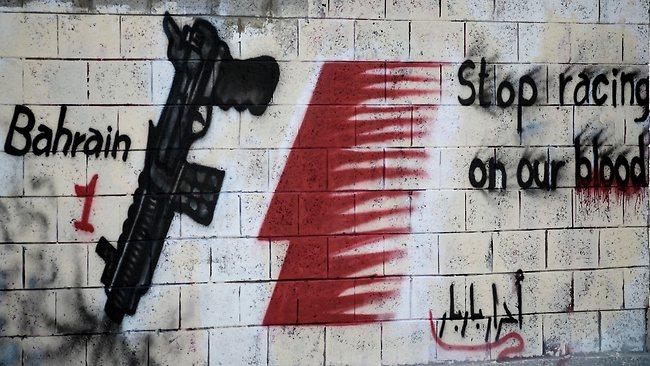Formula 1 Grand Prix puts Bahrain brutality in focus
THEY looked unlikely revolutionaries as they carried their toddlers in their arms and waved national flags and banners.

THEY looked unlikely revolutionaries as they carried their toddlers in their arms and waved national flags and banners.
Women, dressed head to foot in the traditional black abaya, the long black garments of Islam, took to the streets of their small village of Al Dair, which adjoins the secure walls and barbed wire around Bahrain International Airport.
At the end of the street, a phalanx of police was watchful but not prepared to venture into the thousands of marchers - men, women and children - who shouted "Down, down Hamad", their call for the overthrow of their king.
But it was the women who drew the attention, all seemingly with a story to tell of husbands beaten and tortured, sons languishing in prison, fathers returned broken, sometimes dead.
This was a cry for freedom and a challenge to a sport that has set up its camp with the ruling regime they despise.
If Formula One had any doubts whether it was welcome in this island kingdom this weekend, they had only to read the banner carried by four small boys, which read simply: "Freedom, not Formula One."
This is just the start. There were skirmishes around Bahrain yesterday, but the radical Coalition of the Youth of February 14 promises at least a dozen serious protests today and it is planning more activity in Manama, the capital, as the grand prix gets closer.
Rumour flies through the ranks of these protesters that radicals are planning to smuggle as many as 50 activists into the Bahrain International Circuit on Sunday. How, and to do what, no one knows, but they want the world to know this grand prix is as unwelcome as their rulers.
Yet the protesters in Al Dair were a gentle, smiling bunch. They offered oranges and water to quench my thirst under a hot, dusty sun and they offered dinner and then brought tea when I said I was moving on.
Then we waited together for the prayers to end in the local mosque and for the police to come, as they have every night, laying down a carpet of teargas that seeps into homes, stings the eyes of tiny children in their beds and leaves old people wheezing.
On a night like this, F1 feels like an extraordinary irrelevance. I found this protest intensely moving, if only for the gentle kindness and genuine warmth of the people involved.
There were too many stories to tell, like the little girl of 12 who lost her father, a blogger arrested and delivered home dead. She is cared for by her uncle now.
Drawings of men painted on cream walls are makeshift shrines to the dead.
Late last night we sat in a coffee shop on one of Bahrain's main highways into Manama waiting for the signal to chase the next in the series of marches.
It was full of young men and women and the tension crackled as we grabbed a shot of caffeine to steel nerves. In Sitra, a few miles away, there were already flames from petrol bombs thrown by young men in retaliation for the shotguns and teargas. We followed a human chain winding from the village of Diraz to the main highway to confront the police and inevitably more teargas, more bullets.
"I am fighting for my future," my driver told me.


